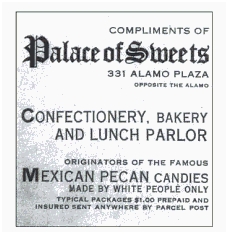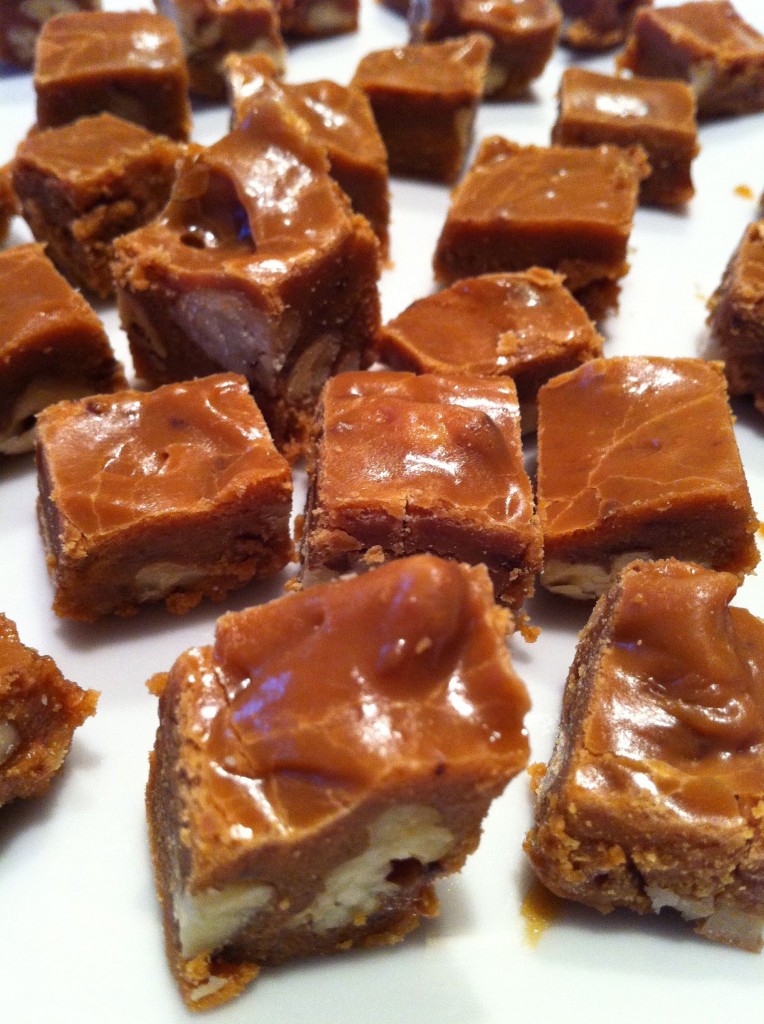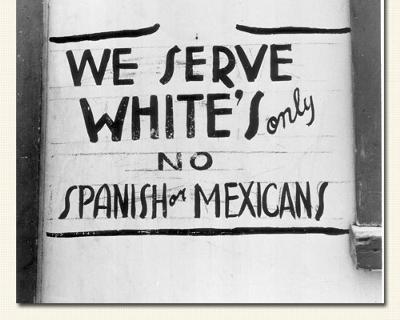Mexican Candy Made by White People Only

The Mexican candy advertisement above is from around 1915’s -20’s. The candy shop was owned by Clyde Corrigan, according to Sarah Gould archivist and researcher at Institute Of Texan Cultures in San Antonio, Texas. It is discussed in the book chronicling segregation of Mexican-Americans, “A Place At The Table,” by Maria Fleming (p.97). Yes, even candy was a place of contestation. I love this Mexican candy because it has pecans (yum!).

Like all the native ingredients of Texas Mexican food, the pecan has a fascinating people history. It is Native to Texas and Mexico. The trees grow all the way to Kentucky, Indiana, Iowa. Our Native American ancestors ate them constantly, sometimes grinding them. I find it wonderful to read a 1709 report by the Spaniard, Isidro Félix de Espinosa, that describes how Texas Indians would string the pecans together with thread as an edible clothing accessory. There’s a fashion statement you don’t see (yet) at New York’s fashion week!
The Pecan has been the occasion for people to encounter each other. But how to encounter the other? There are two choices: rejection or acceptance. Texas Mexican history has been mainly one of rejection. My hope is that food will lead us to acceptance and eventually to celebration.

Celebration is the side of eating that I really love. It’s a simple idea: we enjoy food better when we eat it together, talk and share ideas and world views. Without hospitality, eating is simply feeding. The art of cooking is grounded in the idea of universal humanity.
This “idea” is ancient, and I’m hopeful that we’ll continue trying to get it right.
Walt Whitman describes this “idea” in To Thee Old Cause:
“To thee, old Cause!
Thou peerless, passionate, good cause!
Thou stern, remorseless, sweet Idea!
Deathless throughout the ages, races, lands!
Alma Villanueva gives the “idea” more flesh in Zinz
Jesus said
we are all brothers
Buddha said
we are one
Gandhi said
the same
so did Martin Luther King
—do we inherently know
and fear
our connectedness?—an ancient
African word:
ZINZ
man without racelong ago primal emergence
recorded in the One Mind
man belonged
to the earth
sky,
water,
minerals,
plants,
fungus,
the magic day
the mythical night
the fertility
and grandeur
of all
flowed through
and throughwe fear the slip
into the fertile slime—
the embryonic ooze
too fecund
for the civilized nose
I love Alma Villanueva’s poem. So now, have some fun cooking. Make this candy, Dulce De Leche Quemada, and share it. The ultimate “great idea” is for everyone to have a place at the table. Especially when the dessert is this delicious Mexican pecan candy made by Mexicans!
I recently had my genealogy test and what I was told by rumor is that The two brothers that owed Segovia Mexican Candies are my uncle. I have no proof but that is what I was told. My grandfather’s name is Cruz Segovia. My mothers father.
Correction. It is not Mexican candy, it’s White People Candy. Talk about cultural culinary appropriation.
The best was real Mexican candy made by Segovia’s in my lifetime aqui en SA.
I always dble the pecans in my recipe, add a shot of Kalua and it’s gourmet Mexican candy made by me for me. Que jiddy.